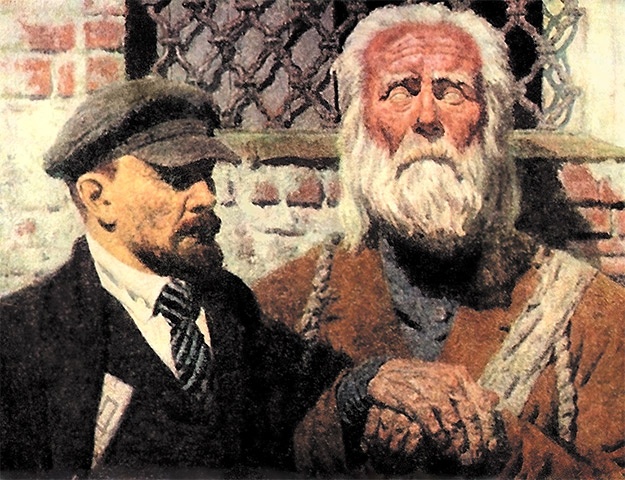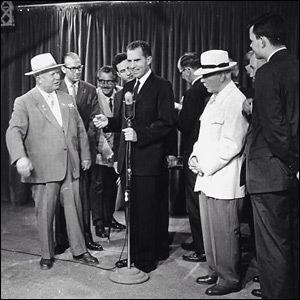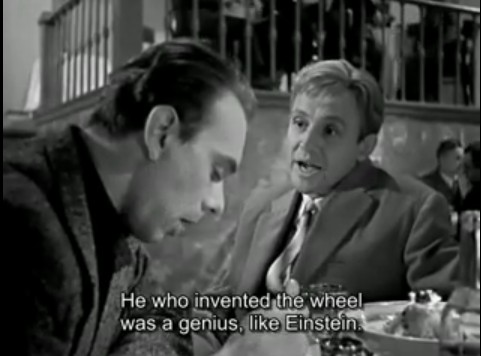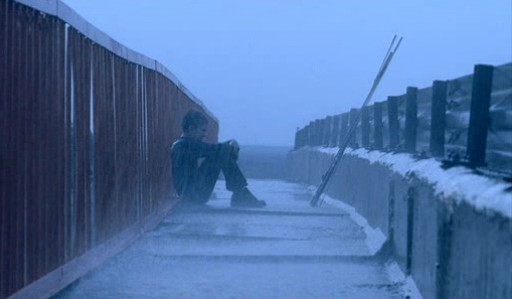
FLR 318 – Russian Cinema and Society
Section 001
Spring 2017
3 Credit Hours
Course meetings: H 4:30-7:15
Instructor: Dr. Vladimir Bilenkin, Associate Professor of Russian
Office: Withers 409
Office hours: H 3:00-4:00 and by appointment

Geli Korzhev. Conversation.1989
Course Description
Russian culture and society through cinema. A study of selected films representative of major social-political, ideological, and artistic developments. Weekly film screenings. No knowledge of Russian required.
GEP Categories: Humanities and Global Knowledge
Humanities
Learning Objectives
Students will
- acquire a basic knowledge of major periods, themes and issues of Russian literature of the 20th century;
- analyze internal elements of a film and relate them to the film's historical context;
- acquire a selected set of concepts used in film analysis and in the history of ideas about man, society,
and nature. These concepts will be examined in films and other visual forms of representation and related to selected historical discourses.
Global Knowledge
Learning Objectives
Students will
-analyze aesthetic, cultural, and ideological changes in Russian Soviet and Post-Soviet cinema, from 1956 to the present day by comparing social and cultural values, artistic and ideological trends as represented in Russian cinema and locating them in contemporaneous contexts of Russian history;
- examine aesthetic and ideological changes in Russian cinema in the context of social, economic, and political developments in the Soviet Union and history of the Cold War.
GEP Co-requisites
This course does not fulfill a General Education Program co-requisite.
Course Structure
Lectures, class discussions, brief reports.
Course Policies
No eating and drinking during the class. No electronic devices in class unless requested by the instructor.
Course Materials
All materials in this course are based online or on electronic reserve.
Readings
Josephine Woll. Real Images: Soviet Cinema and the Thaw. 2000. Electronic reserve.
Alexander V. Prusin & Scott C. Zeman. "Taming Russia's Wild East." Online
Barbara Quart. "Between Materialism and Mysticism: The films of Larisa Shepitko." Electronic Reserve
Christina Stojanova. "New Russian Cinema." Online
Wiki article on Khrushchev Thaw. Online
Wiki article on First Chechen War. Online
Andrei Tarkovsky’s selected interviews. Online
Andrei Zvyagintsev's selected interviews. Online

Nikita Khrushchev and Richard Nixon.
Films
Forty First by Grigory Chukhrai. Online
Cranes Are Flying by Mikhail Kalatozov. Online
Destiny of a Man by Sergei Bondarchuk. Online
Ballad of a Soldier by Grigory Chukhrai. Online
Nine Days of One Year by Mikhail Romm. Online
White Sun of the Desert by Vladimir Motyl. Online
The Mirror by Andrei Tarkovsky. Online
The Ascent by Larisa Shepitko. Online
Cold Summer of '53 by Aleksandr Proshkin. Online
Burnt by the Sun by Nikita Mikhalkov. Online
Prisoner of the Mountains by Sergei Bodrov. Online
Brother and Brother 2 by Alexei Balabanov. Online
The Return by Andrei Zvyagintsev. Online
Elena by Andrei Zvyagintsev. Online
Documentaries
Karl Marx and Marxism. Online
War of the Century (Part 1-4). Online
Perestroika: From Re-Building to Collapse. Online
The Political Incident of October. Online
Thieves by Law. Online
Major topics to be covered and required readings including laboratory and studio topics.
Socialist realism. Soviet Cinema and Russian society in the ‘Thaw’ (1956-1966). WWII and the Great Patriotic War. The General Theory of the Soviet Union. Cultural Reaction in the USSR and its representations in Soviet Cinema. The Cinema of ‘Perestroika’ (1985-1991). Post-Soviet Cinema and Society. Selected films and documentaries. Post-Modernism and the Cultural Politics of the 1990s. Stabilization of Russian Society and New realism.
Required readings
Josephine Woll. Real Images: Soviet Cinema and the Thaw. 2000. Electronic reserve.
Alexander V. Prusin & Scott C. Zeman. "Taming Russia's Wild East." Online
Barbara Quart. "Between Materialism and Mysticism: The films of Larisa Shepitko." Electronic Reserve
Christina Stojanova. "New Russian Cinema." Online
Wiki article on Khrushchev Thaw. Online
Wiki article on First Chechen War. Online
Andrei Tarkovsky’s selected interviews. Online
Andrei Zvyagintsev's selected interviews. Online
Overall Objectives of this course
This course will:
• provide an overview and in-depth discussion of Soviet Russian and post-Soviet political and cultural history, with the emphasis on the Marxist roots of Soviet ideology;
• introduce students to a selection of major Russian films from 1956 to present, accompanied by the analysis of their ideas and relation to social reality and human condition;
• provide students with a set of concepts to analyze and interpret films;
• introduce students to several methods of critical analysis.
Student Learning Outcomes
Upon successful completion of this course, students will be able to:
-describe the social and cultural significance of Russian cinema from the post-war years to the present;
-evaluate the ways in which the interpretation of Russian films can deepen their knowledge and understanding of the modern world;
-analyze the relationship between cinematic representations, national culture, social reality, contemporaneous ideological and political contexts;
-describe key social and cultural values, ideas, issues and trends in Soviet and post-Soviet Russian cinema and locate them in specific contexts of modern Russia’s history;
-analyze and interpret films as vehicles of ideological messages;
- describe by using cinematic examples some major changes in Soviet Russian and post-Soviet society and culture;
- critically approach American reviews of Russian films based on their acquired knowledge of Russian post-war history and culture.
List any required field trips, out of class activities, and/or guest speakers.
None
Expenses
None.
Materials
None.
Requisites and Restrictions
None
Prerequisites
None.
Co-requisites
None.
Restrictions
None.
Transportation
This course will not require students to provide their own transportation. Non-scheduled class time for field trips or out-of-class activities is NOT required for this class.
Safety & Risk Assumptions
None.
Grading
Grade Components
Quizzes -- 30%
Mid-term exam – 30%
Final Exam – 40%
Letter Grades
This Course uses Standard NCSU Letter Grading:
97 |
≤ |
A+ |
≤ |
100 |
93 |
≤ |
A |
< |
97 |
90 |
≤ |
A- |
< |
93 |
87 |
≤ |
B+ |
< |
90 |
83 |
≤ |
B |
< |
87 |
80 |
≤ |
B- |
< |
83 |
77 |
≤ |
C+ |
< |
80 |
73 |
≤ |
C |
< |
77 |
70 |
≤ |
C- |
< |
73 |
67 |
≤ |
D+ |
< |
70 |
63 |
≤ |
D |
< |
67 |
60 |
≤ |
D- |
< |
63 |
0 |
≤ |
F |
< |
60 |
Requirements for Credit-Only (S/U) Grading
In order to receive a grade of S, students are required to take all exams and quizzes, complete all assignments, and earn a grade of C- or better. Conversion from letter grading to credit only (S/U) grading is subject to university deadlines. Refer to the Registration and Records calendar for deadlines related to grading. For more details refer to http://policies.ncsu.edu/regulation/reg-02-20-15.
Requirements for Auditors (AU)
Information about and requirements for auditing a course can be found at http://policies.ncsu.edu/regulation/reg-02-20-04.
Policies on Incomplete Grades
If an extended deadline is not authorized by the instructor or department, an unfinished incomplete grade will automatically change to an F after either (a) the end of the next regular semester in which the student is enrolled (not including summer sessions), or (b) the end of 12 months if the student is not enrolled, whichever is shorter. Incompletes that change to F will count as an attempted course on transcripts. The burden of fulfilling an incomplete grade is the responsibility of the student. The university policy on incomplete grades is located at http://policies.ncsu.edu/regulation/reg-02-50-3.
Late Assignments
The Instructor will accept assignments more than one week late if students have made prior arrangements with the instructor and the instructor agrees to an extension. Students who submit work late (but no later than the next class meeting) receive a penalty of 10 percent applied to the grade achieved on the late assignment.
Attendance Policy
For complete attendance and excused absence policies, please see http://policies.ncsu.edu/regulation/reg-02-20-03
Attendance Policy
Attendance and full participation in classes and examinations is expected of all students. I may request to provide documentation for multiple consecutive class absences or frequent single class absences.
Absences Policy
The NCSU rules for excused absences will apply.
Makeup Work Policy
Ordinarily, no make-up is provided for missed in-class activities. In the event of an excused absence, students should arrange with me for a reading quiz make up no before the next class meeting.
Additional Excuses Policy
None.
Academic Integrity
Students are required to comply with the university policy on academic integrity found in the Code of Student Conduct found at http://policies.ncsu.edu/policy/pol-11-35-01
None.
Academic Honesty
See http://policies.ncsu.edu/policy/pol-11-35-01 for a detailed explanation of academic honesty.
None.
Honor Pledge
Your signature on any test or assignment indicates "I have neither given nor received unauthorized aid on this test or assignment."
Electronically-Hosted Course Components
Students may be required to disclose personally identifiable information to other students in the course, via electronic tools like email or web-postings, where relevant to the course. Examples include online discussions of class topics, and posting of student coursework. All students are expected to respect the privacy of each other by not sharing or using such information outside the course.
Accommodations for Disabilities
Reasonable accommodations will be made for students with verifiable disabilities. In order to take advantage of available accommodations, students must register with the Disability Services Office at Suite 2221, Student Health Center, Campus Box 7509, 919-515-7653. For more information on NC State's policy on working with students with disabilities, please see the Academic Accommodations for Students with Disabilities Regulation (REG02.20.01)
Non-Discrimination Policy
NC State University provides equality of opportunity in education and employment for all students and employees. Accordingly, NC State affirms its commitment to maintain a work environment for all employees and an academic environment for all students that is free from all forms of discrimination. Discrimination based on race, color, religion, creed, sex, national origin, age, disability, veteran status, or sexual orientation is a violation of state and federal law and/or NC State University policy and will not be tolerated. Harassment of any person (either in the form of quid pro quo or creation of a hostile environment) based on race, color, religion, creed, sex, national origin, age, disability, veteran status, or sexual orientation also is a violation of state and federal law and/or NC State University policy and will not be tolerated. Retaliation against any person who complains about discrimination is also prohibited. NC State's policies and regulations covering discrimination, harassment, and retaliation may be accessed at http://policies.ncsu.edu/policy/pol-04-25-05 or http://www.ncsu.edu/equal_op/. Any person who feels that he or she has been the subject of prohibited discrimination, harassment, or retaliation should contact the Office for Equal Opportunity (OEO) at 919-515-3148.
Course Topics and Schedule
NOTE: The course schedule is subject to change.
Course Schedule
Week 1-6
Socialist realism. Soviet Cinema and Russian society in the ‘Thaw’ (1956-1966). World War II and the Great Patriotic War in Soviet Cinema. Cultural and ideological consequences of Soviet war experience.

Mikhail Romm. Nine Days of One Year. 1961
Readings: Woll. Real Images. Selected chapters. Wiki article on Khrushchev’s Thaw.
Screenings:
Forty First by Grigory Chukhrai.
Cranes Are Flying by Mikhail Kalatozov.
Destiny of a Man by Sergei Bondarchuk.
Ballad of a Soldier by Grigory Chukhrai.
Nine Days of One Year by Mikhail Romm.
Karl Marx and Marxism.
War of the Century (Part 1-4).
Week 7-10
The Cold War. Cultural Reaction in the USSR and its representations in Soviet Cinema. General Theory of the USSR and late Soviet Society.
Readings: Woll. Real Images. Selected chapters
Selected interviews by Andrei Tarkovsky.
Alexander V. Prusin & Scott C. Zeman. "Taming Russia's Wild East."
Barbara Quart. "Between Materialism and Mysticism: The films of Larisa Shepitko."
Screenings:
Nine Days of One Year by Mikhail Romm.
White Sun of the Desert by Vladimir Motyl.
The Mirror by Andrei Tarkovsky.
The Ascent by Larisa Shepitko.

Andrei Zvyagintsev. The Return. 2003
Week 11-13
‘Perestroika’: -- Mikhail Gorbachev’s course of “Reconstruction and Openness” and cultural changes in 1985-1990. The post-Soviet cinema of the 1990s.Post-Modernism and the Cultural Politics of the 1990s.
Readings:
Christina Stojanova. "New Russian Cinema."
Wiki article on First Chechen War.
Screenings:
Cold Summer of '53 by Aleksandr Proshkin.
Burnt by the Sun by Nikita Mikhalkov.
Prisoner of the Mountains by Sergei Bodrov.
Brother and Brother 2 by Alexei Balabanov.
Documentary Perestroika: From Re-Building to Collapse. Online
Documentary The Political Incident of October.

Week 14-15
The 2000s: Stabilization of Russian State and Society and New realism.
Readings: Selected interviews by Andrei Zvyagintsev.
Screenings:
The Return by Andrei Zvyagintsev
Elena by Andrei Zvyagintsev
Documentary Thieves by Law.
Final Exam